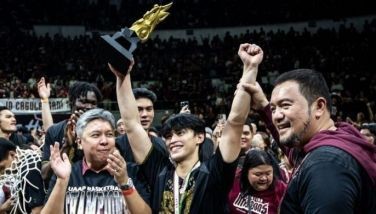On being PBA commissioner
The search for the next PBA commissioner is starting to look like a wishing well with everybody throwing their two cents in. The main difference is that, with a wishing well you keep your desire to yourself. As is the wont of basketball fans in the Philippines, they toss in their opinions with a certain insistence that they should be made right. So suddenly, we have familiar names being thrown in for consideration regardless of their current qualifications and the length of time that they have been away from the game. But there are many more complex matters to consider beyond merely having had an association with the Association. These are the reasons why it takes time and a lot of thought. On top of all of that, given how big the job is, wanting to take on such a large challenge is another matter. What the league needs is someone with deep managerial expertise and experience, with a strong equanimity of personality, a calming presence in a sea of emotional events.
First of all, the PBA is not the same, linear organization it was in 1975. The corporations that own teams are no longer family-run companies. Many are gargantuan multinationals with billions of dollars in equity. This adds certain layers of protocol and delegation due to the value of the time of the team owners. In the league’s pioneering days, Commissioner Leo Prieto could meet directly with the team owners if he needed their decision on important matters, because they were the league’s original board. Now, the PBA is but one facet of many of these companies’ operations, and has a Board of Governors who help create policy and change with the times. The next PBA commissioner has to be able to navigate the currents of what the governors and owners want to achieve, and make plans while factoring in the time it will take to make decisions that will please everyone.
Secondly, the job is far more time-consuming than it used to be. Remember that games used to be played only thrice a week, and there were very few out-of-town games. Even as recently as the 1990’s, the league would book Araneta Coliseum for at least 105 playing days a year. Now that number has swollen. This means that, as much as is humanly possible, the commissioner has a far greater number of games to personally attend. Given that there are more teams – with the possibility of further expansion over the next few years – this task alone would seem like a full-time job. And the commissioner isn’t just watching the games: he is managing them. He is watching the demeanor of the players’ coaches, staff, referees and technical officials. Games and Amusements Board personnel are also on hand to monitor the conduct of the games, and celebrities and valued patrons also attend. He has to have his full attention on what is going on within the basketball court for the full five hours or so of each playing day. He also has his own post-game analysis and evaluation. Would anyone nominated for the position have the endurance to do that essentially 10 and a half months of the year?
Speaking of post-game matters, the commissioner also personally meets with coaches, players, referees and other team or league officials who perform below standards, question authority of generally misbehave. He also considers what appropriate penalties should be imposed for such misbehavior. If he is too lenient, the likelihood of a repetition of the behavior becomes more likely. If he is too harsh, he is perceived as heartless or unfair. This in itself is a difficult balance to maintain. Much of the job requires whether to attend to the urgent or the important first. And everything is important.
Fourth, the commissioner has to also be able to step back and think about the long-term. This year, the league recorded its largest crowd ever on opening day. A panoramic shot of the Philippine Arena crowd has replaced the photo of the old record in the PBA boardroom. How do you top that? It will also include Asian players as an option for this season. In which directions should the league go? Should the league build its own arena, regardless of who gets the credit? Should it have its own television production team? For that matter, should it create its own broadcast channel? How will it grow its merchandising? How much further can it expand in terms of membership? Is it feasible that some of those teams be based in the Visayas or Mindanao? Should member teams participate in commercial tournaments overseas? Everybody has ideas, but it’s the commissioner who has to execute most of those approved.
Each team has its own philosophy, and each franchise’s representative has their own personality. And while thinking league first is the priority, everybody also wants to win. Everyone has an image to maintain and a reputation to uphold, and they guard these fiercely. Business interests also come into play, and the commissioner has to make sure that everyone feels that they are treated well, treated fairly, and listened to. More teams also means more people who give their input. When you put several highly accomplished, influential people in one room, it can get tense. This, I feel has been one of Chito Salud’s greatest gifts: maintaining the equilibrium while implementing change. And it is a constant challenge.
There is an old joke about referees that says you know you’re doing a good job if only half of the people complain. This means that usually, it’s only fans of the winning team who are happy. But if you’re commissioner, it’s not as clearly defined. You are dealing with varying degrees of satisfaction from all sectors of the basketball community. Given the deep knowledge of the game fans have, there will be times when winning is not enough, when the quality of the game, the officiating (and often the comments afterward) have a bearing on perception of your performance. Perception nowadays seems to be easily impacted by one negative retort by a current or past stakeholder on social media. In a culture that finds it so easy to doubt sincerity, the commissioner must have a cast-iron stomach to take the flak that may not be fair, but is out there nonetheless. To a certain extent, he has to know what is said about the league, and what its stakeholders are feeling, to head off any problems that may arise, at all times.
Ideally, the PBA commissioner should be able to manage the expectations and interests within the league and outside it. He or she has to be able to listen without immediately deciding until having heard all sides, maintain objectivity, stimulate growth, build on a legacy, create more interest, maintain a good relationship with the media, court the fans, take care of the players, and always think of what would benefit the league first and foremost. It is definitely not an easy job, but it can be done and done well, as Salud and past commissioners have proven. A growing challenge of future commissioners will be to do something that hasn’t been done before, as the office has been characterized by innovation and success for most of the past 40 years.
- Latest
- Trending



























